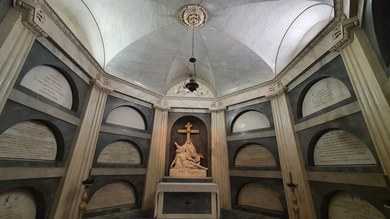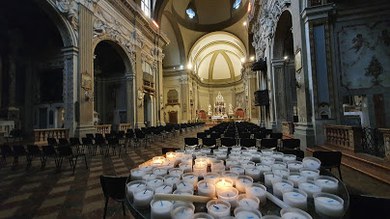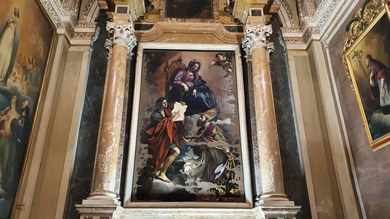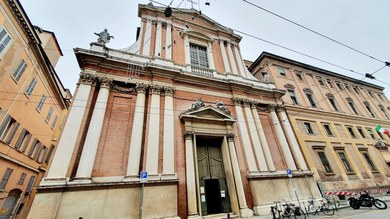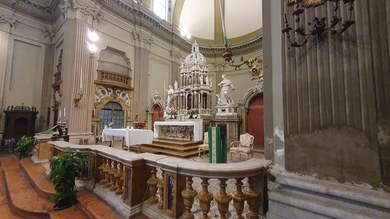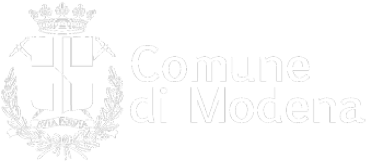San Vincenzo church
Ownership: Parrocchia di San Biagio (Modena)
The church follows the general plan used in the Theatine church of S. Andrea della Valle in Rome.
The side on which the church of San Vincenzo would be built was assigned to the Order of the Theatine Clerics Regular in 1614 on the initiative of the House of Este.
In the 1600's, in the ambitious intention of creating the most important sacred building in Modena, the Theatines could rely on the support of the Estensi court and used such architects and sculptors as Bartolomeo Avanzini and Tommaso Loraghi who plied their trade for the Estensi court. This was particularly the case for the two new buildings that Francesco I was having built: the Palazzo Ducale of Modena and the Delizia of Sassuolo.
The single wide, longitudinal nave of the church is lined with chapels where the Theatine fathers celebrated Holy Mass simultaneously.
The nave, cupola, transept and apse of the church were decorated with frescos but at different times.
The presbytery and choir was destroyed, a large portion of the frescos in the apse - that Sigismondo Caula painted for the Theatines - and all those in the cupola were damaged by bombing on May 13, 1944. The central portion of the cupola depicts the glory of St. Vincent being carried by angels up toward the Trinity. The pendentives show the virtue of the Theatine order.
The recent cleaning of the frescoed surface of the vault and walls have given new brilliance to the magnificent ornamental complex of the broad central nave.
The decorations on the walls are divided into two broad horizontal strips by a sharply overhanging stucco frame designed for the Theatines around the mid 1600's by the Roman architect Bartolomeo Avanzini.
The stucco decorations are similar to the plastic décor of the stuccoed Apartment in the Palazzo Ducale in Sassuolo and, indeed, they were performed by the same group.
Above the arches that provide access to the chapels, pairs of angels in strong relief enliven the walls with their graceful gestures and flowing robes.
In the dimly lit chapels, illuminated only by the light reflected in from the broad nave, a precious touch of colour is derived from the painted canvases, frescos and polychrome marbles that have been given renewed visibility.
The large painting depicting the “Madonna enthroned, San Giovanni Evangelista and San Gregorio thaumaturgus", completed by Guercino in 1630, was commissioned by duke Alfonso II d'Este.
Fruit of the cooperation between the Roman architect Bartolomeo Avanzini and Lombard stonecutter Tommaso Loraghi, aided by the sculptor Giovanni Lazzoni from Carrara, the tabernacle and main altar complex are the most spectacular examples of works commissioned for the Theatine church by the Estensi. Admired by contemporaries for the splendour and wealth of the marble and for the skilled architecture, the tabernacle was destined to be one of those artistic vehicles Francesco I with an artistic policy calibrated against Rome and the great capitals of Europe-used to advance his image as "prince and hero of Christianity".
The most noteworthy statues are not those somewhat repetitive miniatures at the base of the tambour of the tabernacle-temple depicting the Savior and Theatine saints, but rather those on the sides of the altar: a blessed soul and a saint, princes of virtue in the service of the church and perennial glory of their caste.
The whole is completed by full-height statues of San Contardo d'Este (co-protector of Modena) and the blessed Amedeo di Savoia, carved by Giovanni Lazzoni, a sculptor from Carrara.
The facade was inaugurated in 1761. The Florentine architect Niccolò Maria Gaspare Paoletti elaborated the design. Statues made of Carrara marble complete the facade: St.Vincent Mertyr and St. Cajetan of Thiene above the pilasters. Faith and Hope on the tympanum. They have been attributed to the workshop of Giovanni Antonio Cybei, a sculptor from Carrara.
After the espulsionof the Theatine Order – as a result of ducal soppression in 1782 – the church would increasingly take on the function of a funerary memorial to the Este family. In 1838 the architect Francesco Vandelli produced a design for the new Este family Chapel. A new monument was completed in 1850 for Maria Beatrice Vittoria di Savoia, the consort of duke Francesco IV d'Asburgo Este, sculpted by Luigi Mainoni, on the basis of a disegn by Adeodato Malatesta.
Opening hours
The church is open from Monday to Saturday 8.30 am - 2.30 pm. The church opens on Sunday for the Holy Mass at 11.15 am. Visits are not allowed during celebrations.
For further information, contact 320-7089907 during the church opening times.
Tickets and admission
Free entrance.


